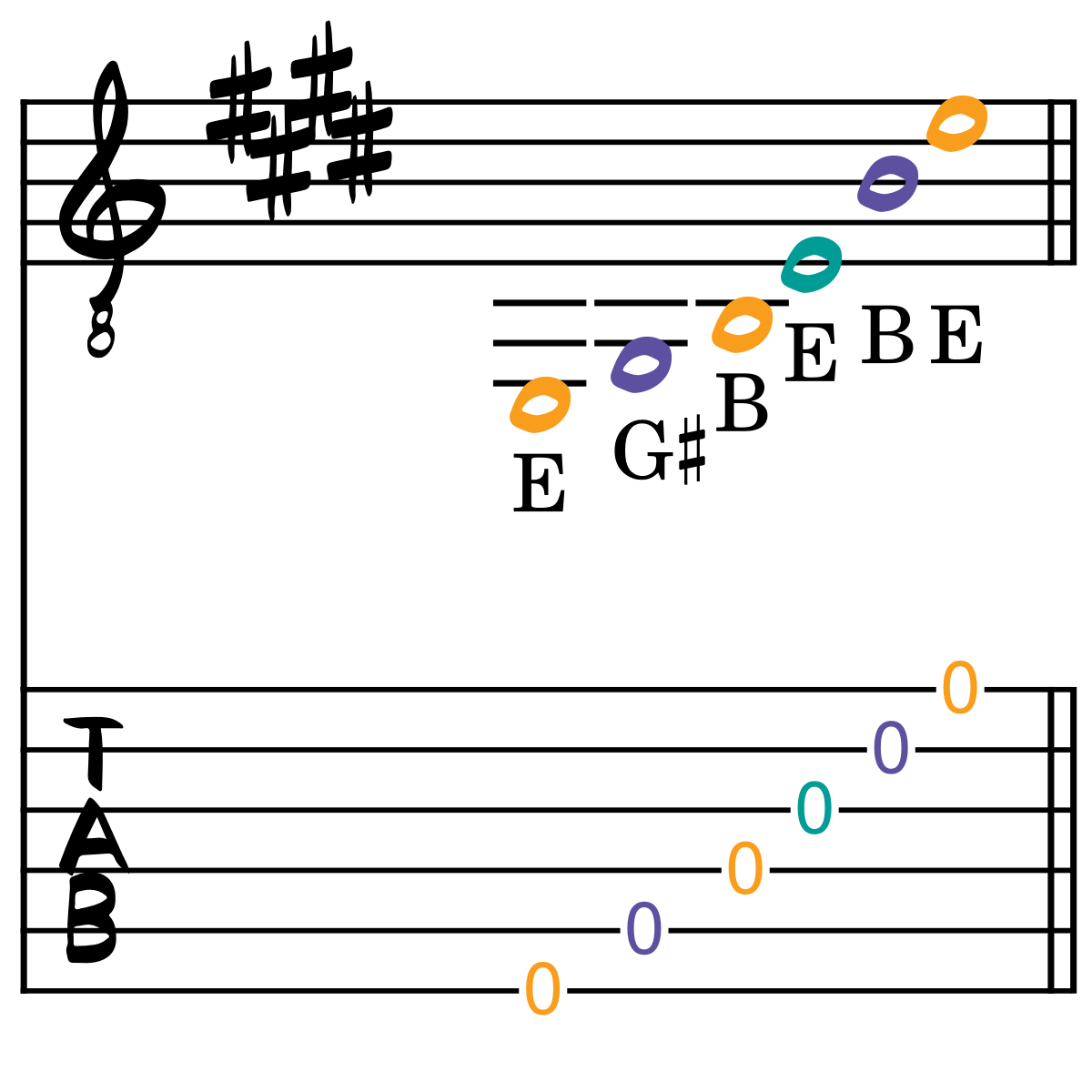Not sure if you should learn piano or guitar? This list should help you decide.
Okay, before we get into this ultimate list of pros and cons, where we compare piano vs guitar, let’s be honest.
It's generally easier to play simple songs on the piano than on the guitar, even though reaching an advanced level is equally hard for both instruments.
So luckily, if you want to go beyond playing very simple songs on the piano, but you're not exactly a keyboard fanatic, you should consider learning fingerstyle guitar, because it's seriously awesome.
Still on the fence? Fair enough.
Let's walk through some pros and cons of learning guitar vs. learning the piano, starting with the keyboard.
Pros and Cons of Learning The Piano
Pull out your keyboards, warriors. We're going look at some pros and cons of learning the piano vs. guitar.
Pro: Improves Finger Dexterity & Independence
Piano playing requires coordination between both hands, much like playing fingerstyle guitar.
However, unlike with fingerstyle guitar, each finger creates its own unique sound. Piano technique involves training each finger to play different keys, instead of coordination between the plucking hand and the fretting hand.
This gives you the option to play much more intricate melodies than is possible with guitar, although that's the realm of advanced players.
Con: Requires Knowledge of Reading Music
To play piano beyond a basic level, you must understand how to read sheet music. Specifically, piano music requires you to read two staves of music simultaneously.
This can be challenging especially if you are sight-reading, as you need to scan across the music and also pay attention to where you place your fingers.
It's true that learning to read sheet music is more logical when you use a piano keyboard, as it helps you properly situate the notes.
But it's much easier to understand guitar tabs than it is to learn sheet music.
Pro: Promotes an Understanding of Music Theory
Since most theory and harmony textbooks are designed for piano players, as a guitar player you are constantly adapting them for your use.
It is challenging, although not impossible, for guitarists to gain a comprehensive understanding of harmony, chord progressions, and musical structure without some knowledge of piano. You'll want to start by learning guitar scales, such as the C Major scale.
Because you need to read both treble and bass clef when learning piano, you will progress faster when starting to learn music theory than if you stick to just reading tabs.
Con: Requires the Use of Your Feet
Proper piano technique includes the use of a foot pedal in order to add the correct phrasing and dynamics to your piece of music.
This adds further layers of complexity to learning piano.
You can of course opt to not use the piano pedal at all, but this may cause your playing sound like a cat having a panic attack on a keyboard.
Pro: The Piano is Ubiquitous
Pianos are found in every major city on the planet, and not just in music stores. It's common to find public pianos in parks, shopping malls and other heavily frequented areas.
On the other hand, if you are lucky enough to find a guitar laying around, it's likely missing strings, out of tune and covered in dust.
True, although public pianos may also not necessarily be in tune or even missing keys, they can be useful to practice and to impress others with your skills.
Con: Acoustic Pianos are Large and Cumbersome
Have you ever tried moving a piano?
Every time I get called to move one of those antique upright pianos, I'm always surprised at the weight.
Pianos are heavy instruments constructed of metal and wood, and aren't very easy to move. Grand pianos require specialized services to move them in order to not damage the instrument.
Pro: Fewer Techniques Than Guitar
Let's get back to learning piano, shall we.
With piano, you don't have to worry about all those weird techniques guitarists use. We’re talking about bends, slides, hammer-ons, pull-offs, harmonics, palm muting. The list goes on!
With piano playing, just tickle the keys with your fingers and already, you'll already sound better than 75% of the guitarists out there.
Con: Electric Pianos Aren't The Same As Acoustic Pianos
And that's a problem, because a keyboard really isn't a piano although they seem similar enough.
Although you can learn to play piano with an electric piano with weighted keys, it's not the same as the acoustic instrument.
On the other hand, the electric guitar is much more similar to the acoustic guitar, both in terms of construction and in terms of playability.
Pros and Cons Of Learning Guitar
Now that we got the piano over with, let's first look at some pros and cons of learning to play the guitar.
Pro: Guitar Is Amazing And Versatile
You knew I was going to start off saying that, right?
There is a huge palette of sounds, colours and even percussive effects that you can play on the guitar. With guitar, you can incorporate harmonics to change the timbre of the instrument.
Yeah, I know, you’ve been playing piano for 19 years (good for you, really) but let's face it: the piano is far more limited in timbre, even though you have the ability to play more notes.
With fingerstyle guitar, you can even create the illusion of a full band even if you're just playing by yourself.
Con: Hard To Teach Yourself
Guitar playing requires intricate finger movements, precise coordination, and dexterity.
If you are a self-taught guitarist, it can be hard to debug mistakes and poor technique.
When you start playing guitar, it's going to sound harsh, stiff and the pain on your fingertips can be downright brutal. But in reality, you'll get the same experience learning piano, minus the painful fingertips.
Pro: The Guitar is Intimate
The guitar is a warm and intimate instrument. If you are somewhat shy like me, you appreciate the quieter sound of the guitar.
Compare that to the trumpet, violin or piano: when you start blowing, pecking or scraping away, everyone knows you’re playing!
Con: Arrangements Can Be Hard to Find
I can't tell you the number of times I've needed to develop my own arrangements of popular tunes. ]
It's much easier for a piano player to find a book of songs ready to play on the piano, than for the guitar. I'm doing my best to increase the supply of tabs available to guitarists.
Pro: Inexpensive and Commonly Found
A decent quality guitar is an inexpensive instrument.
Therefore, it's easy to find a good guitar to start learning, and they're also portable since they're lightweight and not bulky.
Compare that to a piano, and especially an electric piano which has more in common with an expensive appliance than a musical instrument.
Con: Requires Regular Maintenance
Yes, you do have to tune an acoustic piano occasionally, but to get the best sound out of your guitar, you will have to change your guitar strings on a regular basis.
Other things like frets eventually wear out and need to be replaced on the guitar. Additionally, it's important to monitor the humidity in your home and use a humidifier if the air is particularly dry.
Does Playing Piano Make It Easier To Play Guitar?
Yes, sort of. Playing piano can provide certain advantages that may make it easier to learn and play fingerstyle guitar, although the level of impact can vary from person to person.
Learning piano allows you to uderstand the structure of music more explicitly, as you have to start off reading melody and accompaniment on the staff.
This understanding can be transferred to fingerstyle guitar, as well as the coordination required for playing multiple parts simultaneously.
Which Should I Learn, Piano or Guitar?
Ultimately, both instruments present their own unique challenges. The most important part is to commit to learning and mastering either guitar or piano.
Remember, it's incredibly rewarding to learn to play an instrument such as piano or guitar. The road ahead is long, but it’s paved with unique challenges and with determination and practice, you'll get there.




